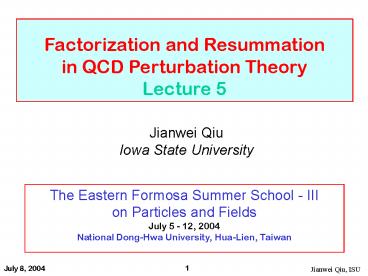Probing small x gluon with low mass DrellYan dilepton PowerPoint PPT Presentation
1 / 34
Title: Probing small x gluon with low mass DrellYan dilepton
1
Factorization and Resummation in QCD
Perturbation Theory Lecture 5
Jianwei Qiu Iowa State University
The Eastern Formosa Summer School - III on
Particles and Fields July 5 - 12, 2004 National
Dong-Hwa University, Hua-Lien, Taiwan
2
Outline of Lecture Five
- QCD at a new level of accuracy
- Processes with double logarithms
- CSS b-space resummation formalism
- Small-x effect and predictive power
- W/Z, and Higgs production
- Upsilon production
3
QCD at a new level of accuracy
- Fermilab Run II and the LHC
- new testing ground for precision test of
QCD
- Heavy boson transverse momentum distribution are
- important for light Higgs search and new
physics
- Resummation of double logarithms is a very
important - part of QCD test and background control for
potential - signals of new physics
- Collins, Soper and Stermans b-space resummation
- has been very successful, but, it has some
drawbacks
- difficulties in extracting predictions from
parameter fitting - due to the needed nonperturbative input
- Lack of consistency between data at collider
energies and - fixed target energies e.g., an overall
normalization, as small - as 0.8, is needed to fit the E288 data
4
Recent developments
- QCD predictive power of CSS formalism has a
strong - dependence on collision energy small-x
effect
- At collider energies, heavy boson
QT-distributions - are not sensitive to the nonperturbative input
- Calculated W and Z QT-distributions are
consistent - with all existing data without any free
fitting parameter
- Predict that Higgs QT-distribution has a very
small - dependence on nonperturbative input
- For the first time, we can quantitatively
understand - Tevatron data on Upsilon production
- Many new applications in B-physics
5
QT-distribution of W production
Showing the different theoretical regions in
momentum space
Drell-Yan type subprocess
Photon can replaced by W, Z, Higgs, etc.
6
QT-distribution in fixed order pQCD
7
Resummation of double logarithms
LO Differential QT-distribution as QT?0
Integrated QT-distribution
8
Resummed QT-distribution
- Differentiate the integrated QT-distribution
- compare to the explicit LO calculation
- We just resummed (exponentiated) an infinite
series of - soft gluon emissions double logarithms
9
Still a wrong QT-distribution
- Experimental fact
Resummation of uncorrelated soft gluon emission
leads to too strong suppression at QT0
- Why?
- Particle can receive many finite kT kicks
- via soft gluon radiation yet still have QT0
- Solution
- impose 4-momentum conservation
- at each step of soft gluon resummation
10
CSS b-space resummation formalism
- Leading order KT-factorized cross section
11
Role of each term in CSS formalism
12
The b-space resummation
13
(No Transcript)
14
(No Transcript)
15
CSS model for the large b-region
- Introduce a non-perturbative Sudakov form factor
- SNP for the large b-region
bmax 0.5
- Potential problems
- Uncertainties in choosing the non-perturbative
function SNP
- Introduce non-perturbative dependence to small-b
region
16
(No Transcript)
17
What is the predictive power of the resummation
formalism?
18
Two typical sets of fitting parameters
19
Predictive power of the formalism
? The QT-distribution is completely
determined by the b-space function
bWAB(b,Q)
bsp
20
Location of the saddle point
21
(No Transcript)
22
(No Transcript)
23
vS-dependence of QCD predictions
Since gluon has a larger anomalous dimension than
quark
Gluon initiated subprocesses should lead to
smaller bsp
Better prediction for Higgs production!
24
Understand the large b-region
25
A new approach to the large b-region
- solution of the CSS evolution equation in
small-b region - preserve the perturbative small b-region
unchanged - solution of the modified CSS evolution equation,
including - leading power corrections, in large b-region
Leading twist
Intrinsic power corrections
Dynamical power corrections
- g1 and a are fixed by the continuity of W(b,Q)
at bmax - vS is built in the value of g1 and a
26
Power correction is very small, excellent
prediction!
27
No free fitting parameter!
28
(No Transcript)
29
(No Transcript)
30
Hadronic Upsilon production
- Process
- Similarities and differences from W/Z, or Higgs
- Events are dominated by low QT region
- Gluon shower should play an important role in
- determine the QT distribution
- M? ltlt MW , or Q is now small
- Heavy b-quark pair is not necessary color
singlet - Additional nonperturbative physics from b-quark
to - Upsilon
- Key approximation
Neglect gluon radiation from heavy quarks
31
The b-space distribution
Gluon-gluon dominate the production Dominated by
perturbative contribution even M?10 GeV
32
Upsilon production at Tevatron
33
Higgs production at the LHC
Uncertainties from the power corrections are less
than 1
34
Resummation in perturbative QCD
- Re-organize the perturbation series
- Leading twist

